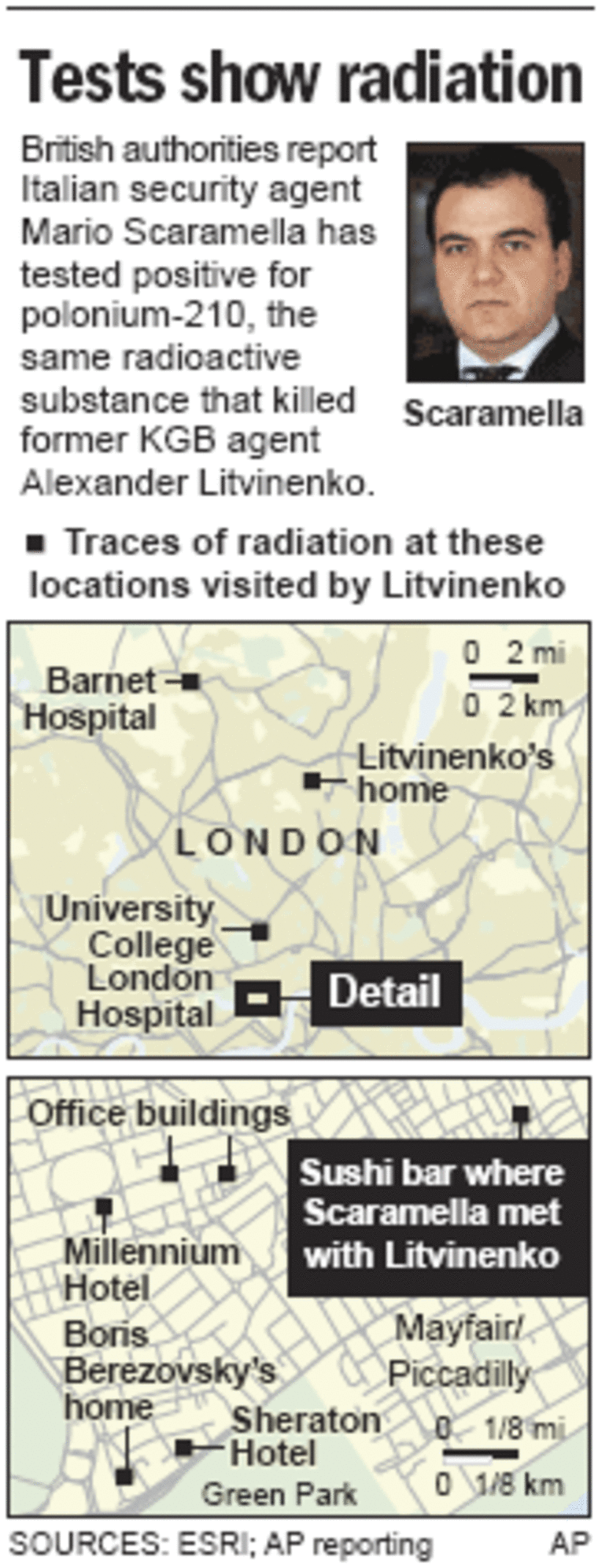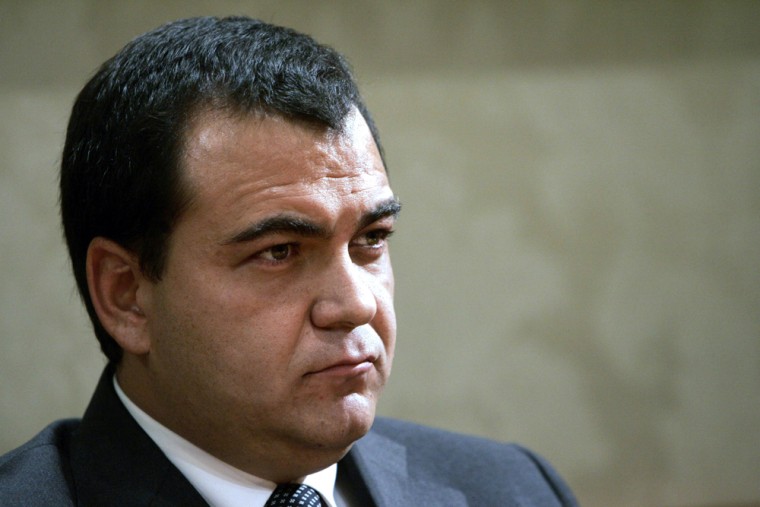An Italian contact of poisoned former Russian spy Alexander Litvinenko said he believed both were targeted with a radioactive substance because of secrets they shared.
Mario Scaramella said on Saturday urine tests showed he had received a potentially lethal dose of polonium 210 — the rare radioactive isotope that killed Litvinenko — and "dangerous concentrations" of polonium would stay in his body for months.
"I have reason to believe that the poisoning of myself and Litvinenko may be connected to information that Litvinenko himself, for months, had transmitted to me," Scaramella said in a statement published by Italian media.
He did not accuse anyone of the poisoning or specify what kind of information Litvinenko had sent him.
Scaramella's dosage of polonium was significantly lower than that of Litvinenko but still considered "potentially lethal and, therefore, capable of killing me," he said.
Litvinenko's mysterious poisoning has sparked a public health scare and strained London's relations with Moscow. From his deathbed, Litvinenko accused Russian President Vladimir Putin of ordering his slow and agonizing death.

The Kremlin denies any involvement and has promised full cooperation with the British investigation. Other theories have centered on the possible involvement of rogue Russian agents.
Feeling well
Scaramella said he felt well and had no symptoms of radiation sickness. But he said he would have to remain under strict medical supervision for months.
He said he was not suspected of killing Litvinenko and London police regarded him as a victim. "I hope to survive to be able to deny all of the defamation, written and spoken, against me," he said.
The London hospital treating Scaramella said he was well and initial tests showed no evidence of radiation sickness.
But Italian Senator Paolo Guzzanti, who spoke to Scaramella by phone, said health officials had told Scaramella the dose of polonium he had received is usually fatal.
"They also said so far, nobody could ever survive this poison, so it is very unlikely he could. But, if he doesn't collapse in three months, there is a kind of hope ... They said that every six months ... the radioactivity decreases by half," he told Reuters.
Scaramella, a KGB expert, met Litvinenko at a London sushi restaurant on Nov. 1, the day the Russian fell ill, to show him e-mails from a source warning their lives might be in danger.
Officials said a female relative of Litvinenko — reported to be his widow, Marina — also had traces of polonium 210 in her urine. They said she was not in short-term danger and any long-term risk was likely to be small.
Meanwhile, British health officials said on Saturday they had checked an area of top soccer club Arsenal's London stadium for radiation, but had found no risk to public health.
Andrei Lugovoi, a former KGB officer who also met Litvinenko on Nov. 1, told British newspapers he travelled to London on Oct. 31 with his wife and three children to watch CSKA Moscow play Arsenal in a Champions League game on Nov. 1.
Lugovoi told London’s Times newspaperlast week Litvinenko had asked to see him to discuss a business opportunity and said he had nothing to do with any attempt on Litvinenko's life.
British authorities said this week that traces of radiation had been found at 12 sites and aboard planes that carried 33,000 passengers in the past month.
An 'all clear'
Britain's Health Protection Agency gave the "all clear" to two easyJet planes Scaramella flew on as well as three British Airways planes linked to the Litvinenko case.
Also on Saturday, British Airways said three jetliners grounded by investigators looking into Litvinenko’s death had been cleared to resume service. Small traces of radioactive substances had been found on the planes, which traveled between Moscow and London since the former spy turned Kremlin critic was poisoned.
“They have all been cleared and they will be back in service in the next few days,” said a BA spokeswoman, speaking on condition of anonymity in line with department policy.
Britain’s Health Protection Agency said though low levels of polonium 210 were found on two of the planes, there was no risk to passengers.
Another airline, easyJet, said Scaramella had flown with them to London from Naples on Oct. 31 and returned on Nov. 3, two days after his meeting with 43-year-old Litvinenko. The HPA said there was no risk to the public from those flights.
Ex-PM tests negative for radiation poisoning
In Ireland, meanwhile, officials said tests on former Russian Prime Minister Yegor Gaidar were negative for radiation poisoning.
“Testing for radioactive poisoning came out negative,” said Rosaleen Harlin of Ireland’s health executive.
Gaidar, now a leader of Russia’s opposition, became violently ill during a conference in Dublin last week in what his aides have described as another poisoning. He is now being treated at a hospital in Moscow, where his condition has been described as improving.
No radiation was found at sites in Ireland visited by Gaidar, officials said on Saturday.
Three pathologists on Friday completed Litvinenko’s autopsy at the Royal London Hospital, coroner Dr. Andrew Reid said. Results of the autopsy may not be available for several days.
